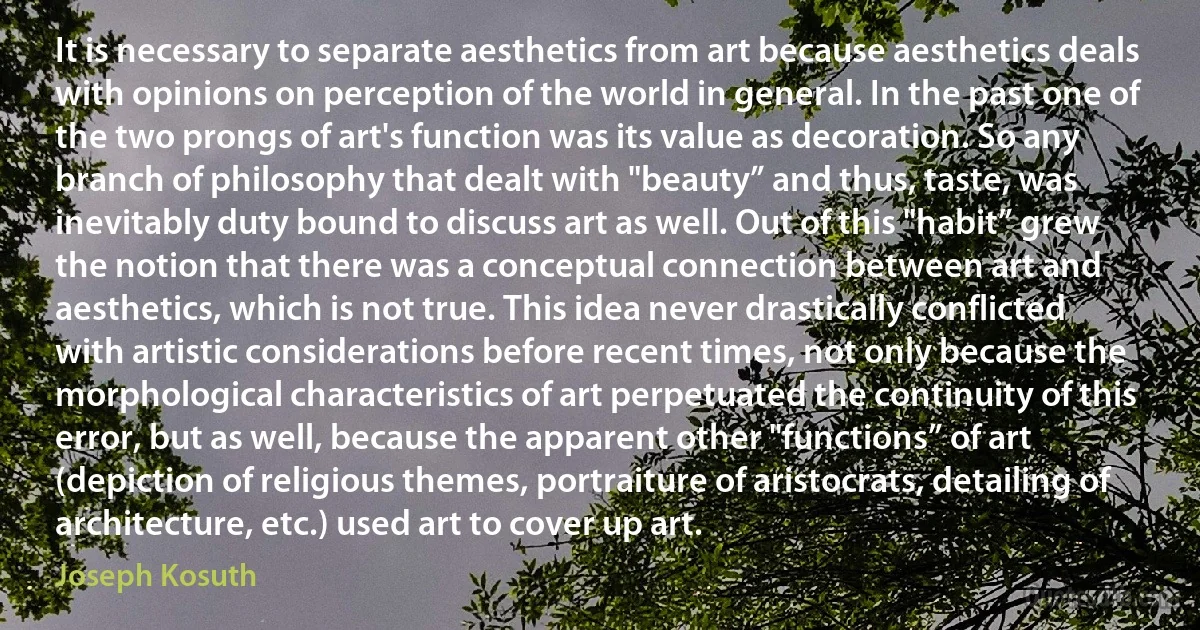
It is necessary to separate aesthetics from art because aesthetics deals with opinions on perception of the world in general. In the past one of the two prongs of art's function was its value as decoration. So any branch of philosophy that dealt with "beauty” and thus, taste, was inevitably duty bound to discuss art as well. Out of this "habit” grew the notion that there was a conceptual connection between art and aesthetics, which is not true. This idea never drastically conflicted with artistic considerations before recent times, not only because the morphological characteristics of art perpetuated the continuity of this error, but as well, because the apparent other "functions” of art (depiction of religious themes, portraiture of aristocrats, detailing of architecture, etc.) used art to cover up art.
Joseph KosuthRelated topics
aesthetics architecture art beauty bound branch connection continuity cover deal depiction detailing duty error general habit idea necessary past perception portraiture taste thus times value well world etcRelated quotes
The good taste we speak of, which is that of literature, is not limited to what we call the sciences, but extends itself imperceptibly to other arts, such as architecture, painting, sculpture, and music. 'Tis the same discerning faculty which introduces universally the same elegance, the same symmetry, and the same order in the disposition of the parts; which inclines us to a noble simplicity, to natural beauties, and a judicious choice of ornaments. On the other hand, the depravation of taste in arts has been always a mark and consequence of the depravation of taste in literature. ... The good taste of literature reaches also to public customs, and the manner of living. An habit of consulting the best rules upon one subject, naturally leads to the doing it also upon others.

Charles Rollin
In her book, Philosophy in a New Key, Susanne Langer remarks that certain ideas burst upon the intellectual landscape with a tremendous force. They resolve so many fundamental problems at once that they seem also to promise that they will resolve all fundamental problems, clarify all obscure issues. Everyone snaps them up as the open sesame of some new positive science, the conceptual center-point around which a comprehensive system of analysis can be built. The sudden vogue of such a grande ideé, crowding out almost everything else for a while, is due, she says, "to the fact that all sensitive and active minds turn at once to exploiting it. We try it in every connection, for every purpose, experiment with possible stretches of its strict meaning, with generalizations and derivatives.”.

Clifford Geertz
The. manager must never be lacking in knowledge of the special profession which is characteristic of the undertaking: the technical profession in industry, commercial in commerce, political in the State, military in the Army, religious in the Church, medical in the hospital, teaching in the school, etc. The technical function has long been given the degree of importance which is its due, and of which we must not deprive it, but the technical function by itself cannot endure the successful running of a business; it needs the help of the other essential functions and particularly of that of administration. This fact is so important from the point of view of the organization and management of a business that I do not mind how often I repeat it in order that it may be fully realized.

Henri Fayol
I now saw, that a science is either deductive or experimental, according as, in the province it deals with, the effects of causes when conjoined, are or are not the sums of the effects which the same causes produce when separate. It followed that politics must be a deductive science. It thus appeared, that both Macaulay and my father were wrong; the one in assimilating the method of philosophising in politics to the purely experimental method of chemistry; while the other, though right in adopting a deductive method, had made a wrong selection of one, having taken as the type of deduction, not the appropriate process, that of the deductive branches of natural philosophy, but the inappropriate one of pure geometry, which, not being a science of causation at all, does not require or admit of any summing-up of effects.

John Stuart Mill
Just as economic pressure from the base ... is able to modify the production of surplus value, so pressure grounded in spatial practice is alone capable of modifying the apportionment of that surplus value - i. e. the distribution of the portion of social surplus production allotted to society's collective 'interests', to so-called social services. Such grass-roots pressure, if it is to be effective in this regard, cannot be confined to attacking the state qua guardian of the 'general interest'. For this state, born of the hegemony of a class, has as one of its functions - and a more and more significant function - the organization of space, the regularization of its flows, the control of its networks. It devotes to these purposes a considerable part of global surplus value, of the surplus production assigned to the running of society.

Henri Lefebvre
